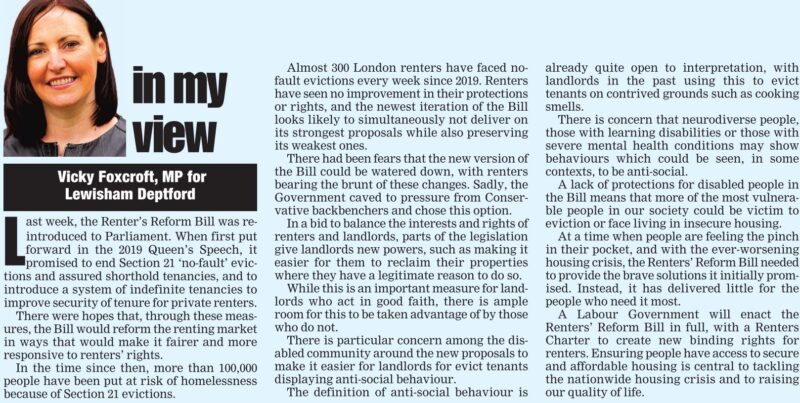Vicky Foxcroft MP for Lewisham Deptford & Shadow Minister for Disabled People
This column appeared in the Friday 3rd November 2023 edition of the South London Press.
Last week, the Renters’ Reform Bill was re-introduced to Parliament. When first put forward in the 2019 Queen’s Speech, it promised to end Section 21 ‘no-fault’ evictions and assured shorthold tenancies, and to introduce a system of indefinite tenancies to improve security of tenure for private renters. There were hopes that, through these measures, the Bill would reform the renting market in ways that would make it fairer and more responsive to renters’ rights.
In the time since then, more than 100,000 people have been put at risk of homelessness because of Section 21 evictions. Almost 300 London renters have faced no-fault evictions every week since 2019. Renters have seen no improvement in their protections or rights, and the newest iteration of the Bill looks likely to simultaneously not deliver on its strongest proposals whilst also preserving its weakest ones.
There had been fears that the new version of the Bill could be watered down, with renters bearing the brunt of these changes. Sadly, the Government caved to pressure from Conservative backbenchers and chose this option.
In a bid to balance the interests and rights of renters and landlords, parts of the legislation give landlords new powers, such as making it easier for them to reclaim their properties where they have a legitimate reason to do so. While this is an important measure for landlords who act in good faith, there is ample room for this to be taken advantage of by those who do not.
There is particular concern among the disabled community around the new proposals to make it easier for landlords for evict tenants displaying anti-social behaviour. The definition of anti-social behaviour is already quite open to interpretation, with landlords in the past using this to evict tenants on contrived grounds such as cooking smells.
There is concern that neurodiverse people, those with learning disabilities or those with severe mental health conditions may show behaviours which could be seen, in some contexts, to be anti-social. A lack of protections for disabled people in the Bill means that more of the most vulnerable people in our society could be victim to eviction or face living in insecure housing.
At a time when people are feeling the pinch in their pocket, and with the ever-worsening housing crisis, the Renters’ Reform Bill needed to provide the brave solutions it initially promised. Instead, it has delivered little for the people who need it most.
A Labour government will enact the Renters’ Reform Bill in full, with a Renters Charter to create new binding rights for renters. Ensuring people have access to secure and affordable housing is central to tackling the nationwide housing crisis and to raising our quality of life.

